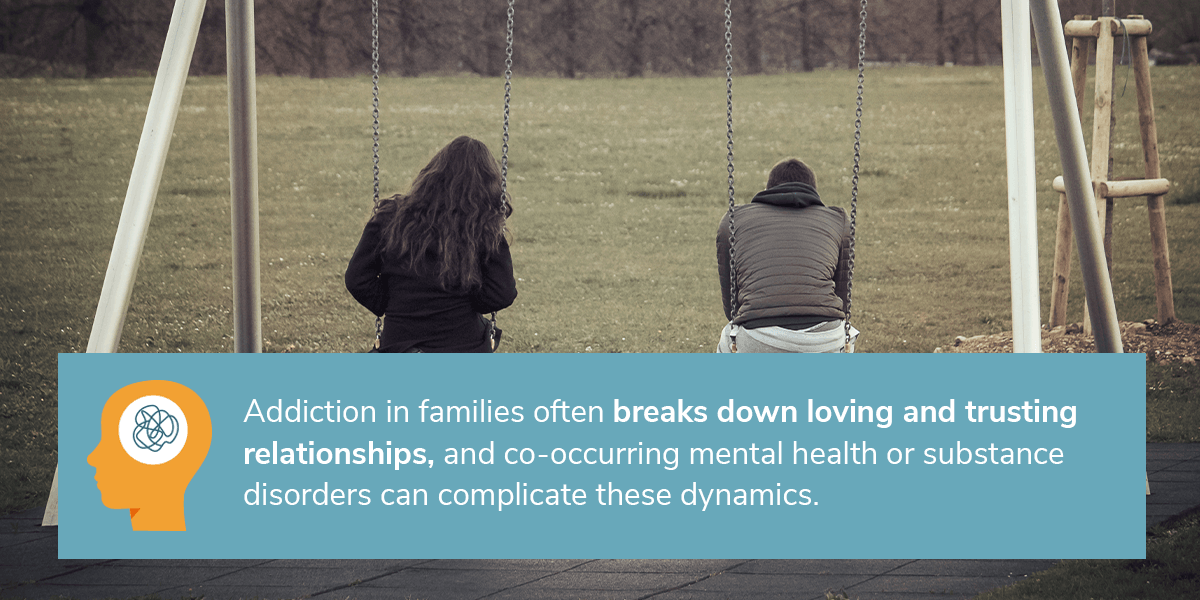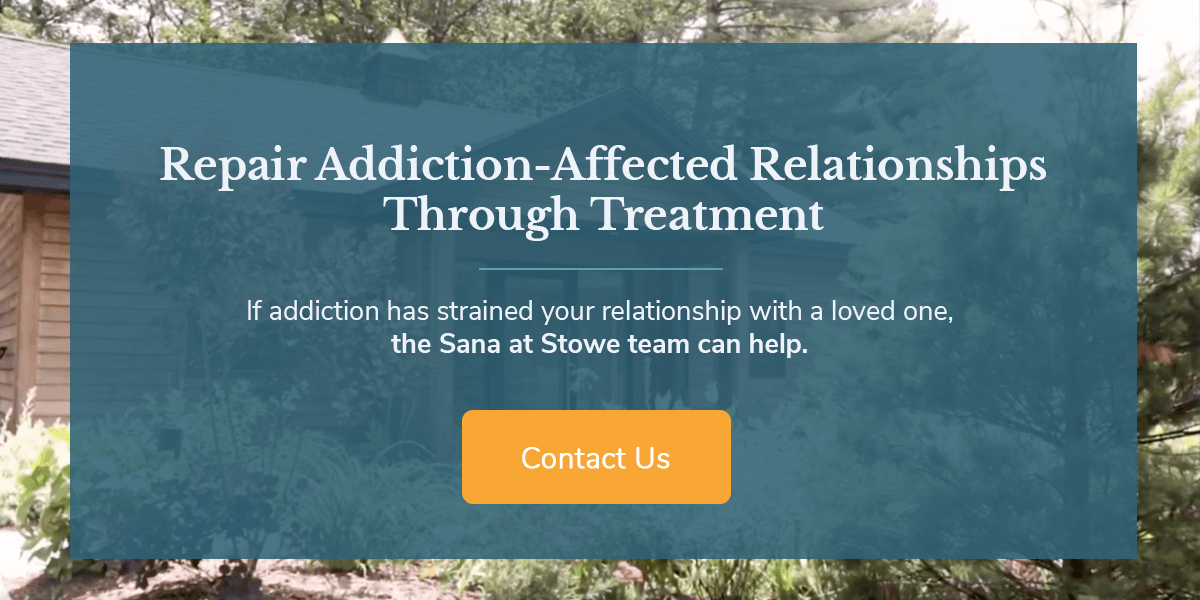An addiction to drugs or alcohol can affect many aspects of your life and the lives of those around you. Family members, partners, and friends can all feel the impact of addiction, which strains relationships in various ways. Understanding how addiction affects relationships can help both parties navigate the effects and support recovery efforts.
Addiction and Relationships
Addiction behaviors in relationships can cause adverse effects in the following areas:
Behavior
Many people with addiction develop harmful behaviors in their search for drugs or alcohol, like keeping secrets or being disrespectful to a spouse. They may take money from a partner or sneak away from their family to use drugs in private. Relationships often deteriorate due to trust issues, resentment, shame, and other emotional difficulties.
A partner’s reaction to the behavior of someone with addiction can contribute to these issues. They may treat addiction as a criminal act or otherwise shame the user, leading to isolation from both sides and less trust. Without trust, the relationship can lose its sense of safety and further isolate the two people.
Some partners attempt to “fix” someone rather than ending a relationship with an addicted person or encouraging treatment from a trained professional. If their attempts don’t work, they may feel guilty or upset. In some cases, well-meaning but unqualified advice hurts the user’s road to recovery.
Addiction can also cause loved ones to neglect taking care of themselves. They may spend significant energy compensating for the other person’s needs or dealing with emotional exhaustion from the situation. Ensuring self-care for both parties is essential for supporting a healthy relationship.
Financial Problems
Addictions are expensive. Street opioids could cost $14,600 a year, while heroin addiction goes up to $92,000 a year. The financial issues of funding an addiction can lead to significant stress in the relationships of people addicted to drugs or alcohol.
Financial hardships can heavily contribute to other problems we’ve discussed, like secrecy, resentment, and anger. The addicted person may also have feelings of guilt and shame.
Sexual Issues
Drugs and alcohol often cause intimacy problems due to both physical and emotional effects. The substances themselves might impede libido and erections and could contribute to infidelity. If drugs or alcohol alter someone’s state of mind, they may find themselves more likely to act on impulses, especially if they bond with other users facing similar problems.
The other emotional problems associated with addiction, such as trust issues and anxiety, may also contribute to sexual issues by causing more conflict between partners or making intimacy more difficult.
Anger and Violence
Many problems associated with addiction contribute to frustration and anger, while some substances cause aggression. Up to three-quarters of people who start substance use disorder treatment said they had engaged in a violent crime like physical assault or mugging. Also, drugs or alcohol are involved in 40%-60% of domestic abuse situations and 80% of child abuse cases.
Sometimes, harmful substances directly cause aggression, but these behaviors also appear when someone uses violence to obtain drugs or alcohol. Other causes include the emotional stressors addiction places on relationships and substance-related side effects like confusion, paranoia, or hallucinations.
Codependency and Enabling
Codependency often occurs when combining drugs and relationships. One person may feel frustrated by the addicted person’s behavior while wanting to take care of them and make them happy — even if that means enabling their addiction. They might take on the role of a martyr or try to control the other person “for their own good.”
You’ll find codependent behaviors in many types of relationships, including couples, families, and friendships.
Family Dynamics of Addiction
Addiction can significantly affect the entire family dynamic, whether the addicted person is a child or a parent. Here are a few ways families of addicted people may experience the disorder:
- Kids: A child who has a parent with addiction may face neglect or mistreatment, and they have an increased risk of developing a substance use disorder themselves. Both genetics and the family environment can contribute to this risk. The parent’s addiction could also create an unstable environment, affecting the child’s ability to form healthy attachments and regulate emotions. Sometimes, the child must act as the parent to compensate for the parent’s behaviors.
- Parents: When a teen develops addiction, some parents become overbearing or controlling. Many have confusion, shame, guilt, and fear. Addiction can cause arguments between parents about how to respond to the substance use, and some try to keep it a family secret.
- Siblings: Siblings often get ignored when another child has an addiction, as the parents’ attention falls on the sibling. They may act out with substance use or another method and feel resentment toward other family members.
Addiction in families often breaks down loving and trusting relationships, and co-occurring mental health or substance disorders can complicate these dynamics. Fortunately, with the right information, families have a lot of power to notice the signs and support the person with addiction.

Treatment for Addiction and Relationship-Building
Addiction treatment often benefits from the involvement of the patient’s loved ones. Naturally, individual therapy for the person with addiction will be essential in mending behaviors. Other options include:
- Individual therapy for the person without addiction: Non-addicted people can use individual therapy to better understand the addicted person and how addiction affects relationships. This knowledge can help them support the person with addiction on the road to recovery. Therapy may also help the person not using substances to work through negative emotions like trust issues and resentment.
- Family or couples therapy: Attending therapy as a family or couple helps everyone see their role in overcoming addiction. The clinician can evaluate family dynamics and provide more appropriate treatment options.
- Support groups: The person not using substances can also attend support groups to find help from other people in similar situations. Some examples include Al-Anon, Parents of Addicted Loved Ones, and Families Anonymous.
In some cases, getting a loved one to start treatment is not easy. A trained interventionist can help you connect to the addicted person and encourage them to seek treatment.
Repair Addiction-Affected Relationships Through Treatment
Treating addiction is a necessary step to mending relationships affected by it. A holistic, evidence-based treatment approach allows the person with addiction to start recovering and addressing the ways the disorder affects those around them. If addiction has strained your relationship with a loved one, the Sana at Stowe team can help.
We offer comprehensive addiction recovery services in the beautiful landscape of Vermont. Our skilled team individualizes treatment for each person, and we can refer loved ones to trusted therapy providers, support groups, and interventionists. Reach out to our team today to learn more.
Sana is Here to Help
Sana is here for you and your loved ones. Sana at Stowe provides high-quality treatment for those struggling with substance abuse, alcohol addiction, trauma, and PTSD. Our compassionate and professional staff is dedicated to giving our patients the recovery experience they deserve in a safe and healing environment. To learn more or to get started on your journey to recovery today, give us a call or visit our contact form.
Click here to call us: 866-575-9958



